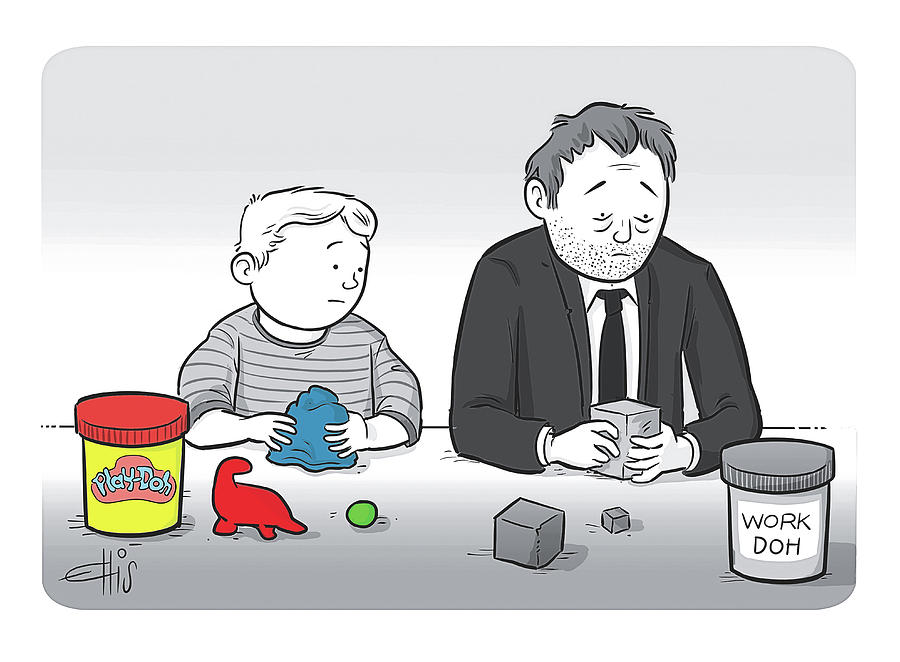By Jonathan Kalan, Co-Founder, Unsettled
Ellis Rosen for The New Yorker
For years now, I’ve secretly envied the job of cartoonists. To look at the world – our everyday interactions, habits, social taboos and norms – in abstract and find the humor, absurdity, and yes, often pain, is a privilege and skill few possess. I’ve imagined myself riding on the subway for hours looking for creative fodder, or listening in to people’s conversations at coffee shops hoping to find that stand-out quote so absurd it just might lead to a great comic.
Fortunately for others, my inability to draw (and dad-joke sense of humor) led me to different career paths. And, there are experts like Ellis Rosen, who do it much, much better.
When we came across Ellis Rosen’s cartoon for The New Yorker above, we needed to speak to the man behind the sketch. We wondered what he had to say about his creative process and how he finds balance and inspiration in a generally unbalanced world. Here’s what he came back with.
—
Name: Ellis Rosen
Current Location: Downtown Brooklyn, NY
Next travel destination: Huntington Beach, California for the National Cartoonists Society festival.
A current word or intention in your life at the moment:
I don’t have a mantra or anything like that but if I did it would be “remain calm” and it would never work.
Do you naturally view the world through a comedic lense? Is it ever difficult for you to find humor or a “sense of play” in the world today?
I think a ‘comedic lense’ is something you can turn off and on. I attempt to keep it on to gather material, but I’m human and capable of being in other, less funny moods. There is certainly a lot to feel bad about. I would say it comes in waves. Sometimes finding the humor in terrible situations is my only way of dealing with it, sometimes it’s just too exhausting or sad. There are certain topics I wont touch, while other ones demand jokes.
How would you describe your creative process?
 I think it’s all about input and output. You can’t have one without the other. I have to read, learn, socialize, do chores and just generally participate in the world. That’s the input. All of that builds in my mind and comes out when I sit down to sketch. Sleeping is important too. I’ve gone to bed without any ideas and woken up with a bunch popped in my head. I sometimes think my subconscious is smarter than me. I also go back to old sketchbooks often. An old half-thought idea that didn’t go anywhere can suddenly have new life when you look at it a year, or even just a month later.
I think it’s all about input and output. You can’t have one without the other. I have to read, learn, socialize, do chores and just generally participate in the world. That’s the input. All of that builds in my mind and comes out when I sit down to sketch. Sleeping is important too. I’ve gone to bed without any ideas and woken up with a bunch popped in my head. I sometimes think my subconscious is smarter than me. I also go back to old sketchbooks often. An old half-thought idea that didn’t go anywhere can suddenly have new life when you look at it a year, or even just a month later.
What helps you maintain a sense of work-life balance?
I don’t feel guilty about slacking off. Don’t get me wrong, I feel guilty about lots of other stuff. Feeling unnecessary guilt is kind of my M.O. But If I don’t slack off that means I won’t be productive either. I’ll just be tired and grumpy.
What does your dream workspace look like? And do you currently have it?
I used to be very concerned with the idea of having a perfect office. Now I think the only necessary thing is a clean office. The less stuff the better. I have that office now as long as you don’t open the drawer. A window is good too.
What’s something you try to do every day to help you show up to the world as best as you can?
I’ll just tell myself to “remain calm.”
—
Looking to inspire your creative process? Find that “acceptable” time to slack off? Check out our upcoming retreats and find your dream office!
Unsettled is a global community for those who live and work differently.
Growth | Meaning | Adventure

0 Comments